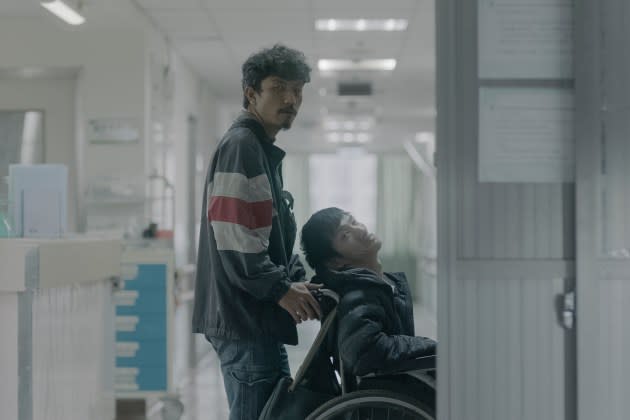‘Mongrel’ Review: Superbly Controlled And Paced Taiwanese Drama Bears Witness To One Of The Great Crimes Of Our Time – Cannes Film Festival

“Don’t you trust me?” It’s a routine question from the man they call Boss, a ruthless character operating at the lower levels of the immigrant trade in Taiwan, adopted home of director Chiang Wei Liang. Nobody trusts Boss (Daniel Hong Yu-Hong), least of all his Thai sidekick Oom (Wanlop Rungkumjad). Perhaps because he is decent and reliable, Oom has been charged with keeping the other workers in their miserable hostel in order. It falls to him to explain why Boss’ own boss, the vile Brother Te, has failed to pay anybody their wages.
Fairly predictably, nobody trusts Oom, either. Oom works as a carer for disabled people whose families are too poor or too mean to pay professionals. If he is alone in a workplace, he is locked in. Like everyone else, he has surrendered his passport and never been paid. They are often hungry. Meals in the hostel are provided when there is some spare cash left from one of Boss’ shabby deals. The only advantage Oom gains from being Boss’ favorite is the fast food Boss sometimes buys when he picks him up from their customers’ houses. A bag of chips may not seem like much of a bonus, but it counts as riches here.
More from Deadline
“He’s my best man,” Boss will assure clients as he bustles Oom into their houses. It is true that Oom is caring, respectful and precise; he can attach a feeding tube or wash away the leavings of incontinence with the calm of a professional. But Oom is also roped in when Boss or Brother Te are planning much dirtier dealings, such as selling some of their resident immigrants to a labor broker. Three will go to fishing boats, two to slaughterhouses: the kinds of jobs where immigrants regularly die. When a careworker called Indri collapses with an unidentified illness, Oom has to get rid of her body in the woods. No doctors, no police, no questions asked. This is modern slavery at work.
Director Chiang has won prizes for his documentary and VR work, but this is his first feature. It is bleak beyond belief, set in a milieu constructed of verifiable fact but so dreadful that it feels like a sci-fi dystopia. It is also an absolutely brilliant piece of filmmaking. Not only is it a sustained act of witness to one of the enduring crimes of our time, but it is superbly controlled, paced and pictorially constructed within the frame.
Here is a director who seems to thrive on risk. Chiang is unafraid of long silences, uninterested in explanations – we are left to piece together for ourselves how these people came to be sequestered in the mountainous Taiwanese interior – and comfortable with darkness. As Oom, Runkumjad can convey a whole scene with a twitch of one eyebrow at the moment when his face catches the light. Even a scene in a nightclub, where Brother Te encourages Boss and Oom to get together on a karaoke number with different words, is so bleached of color that it seems to be in black and white.
Almost every image seems corroded by poverty. The dilapidated houses where Oom cares for the disabled boy and the bedridden grandmother are obscenely cramped, piled with rubbish in their shadowy corners. Cinematographer Michel Capron turns the problem of shooting in these confined spaces into a virtue by shooting frequently through doorways that become frames, memorializing Oom and his clients in tableaux of domestic intimacy.
Poverty is not only a physical privation, however. It manifests in the hostility other workers direct at Oom when Boss is not around, in Brother Te’s brutality, in Boss’ hunched shoulders and lowered eyes. Boss always seems to be trying to avoid the accusing gaze of whoever he is scamming or about to give a beating. When he looks up, you see immediately how much he hates everything he sees. There is a robust physicality to all the performances and the way people are depicted, even the grandma permanently asleep with her mouth open.
Mongrel ends with a brief flash of optimism. As a door opens, we see green trees where before there was only rain; the mountain weather is generally a dismal combination of tropical downpours and freezing temperatures. The disabled boy and his mother – herself barely able to walk – have gone and the title character, soft and brown and gamely negotiating the world on three legs, arrives from nowhere. We really need to see that dog. We all need a friend, because this film is hugely difficult to watch. Who would choose to see it for a night’s entertainment is anyone’s guess. There is a sense after seeing it, however, of having encountered greatness. That is a rarity, even in Cannes.
Title: Mongrel
Festival: Cannes (Directors’ Fortnight)
Directors: Chiang Wei Liang, You Qiao Yin
Cast: Wanlop Rungkumjad, Daniel Hong Yu-hong, Lu Yi-ching, Kuo Shu-wei
Sales agent: Alpha Violet
Running time: 2 hr 8 min
Best of Deadline
2024 Premiere Dates For New & Returning Series On Broadcast, Cable & Streaming
Hollywood & Media Deaths In 2024: Photo Gallery & Obituaries
2024-25 Awards Season Calendar - Dates For Oscars, Tonys, Guilds, BAFTAs, Spirits & More
Sign up for Deadline's Newsletter. For the latest news, follow us on Facebook, Twitter, and Instagram.

